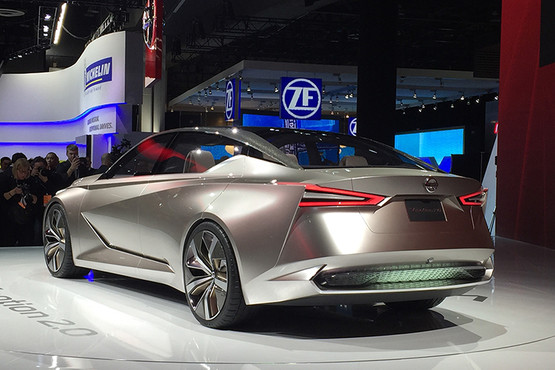Business: China's motor trade Driven to the brink
商業(yè):中國汽車貿(mào)易,逼入絕境
Slowing car sales are a threat to shaky dealerships.
汽車經(jīng)銷商如履薄冰,銷售放緩雪上加霜。
China's car market used to run like a high-revving engine.
中國的汽車市場發(fā)展速度曾如同飛速轉(zhuǎn)動的引擎。
But after double-digit growth in much of the past decade, sales volumes have slowed dramatically.
中國的汽車銷量在過去10年的大部分時間都保持著兩位數(shù)增幅,而今卻急劇放緩。

Barclays, a bank, recently revised its growth forecast for 2015 down from 8.5% to just 1.7%.
近期,巴克萊銀行對2015年中國汽車市場的增長預(yù)期由8.5%下調(diào)為僅1.7%。
Others think sales may even shrink.
更有他人認(rèn)為預(yù)期汽車市場甚至?xí)s。
China's car dealers, mostly newcomers to the business and over-reliant on selling new cars for their livelihoods, are struggling to cope.
中國的汽車經(jīng)銷商正應(yīng)付著艱難的處境,他們中的大多數(shù)都剛剛進(jìn)入這一領(lǐng)域,并過度依賴新車銷售為業(yè)。
Carmakers frantically expanded their networks when sales were booming, and now China has a surfeit of dealers.
當(dāng)業(yè)績斐然時,汽車制造商近乎瘋狂地拓展銷售網(wǎng)絡(luò),這使得如今中國的汽車經(jīng)銷商已過飽和。
By the end of 2014 some 26,400 had set up, according to Sanford C.Bernstein, a research firm, 60% more than in America, even though China's new-car sales are just 40% higher.
據(jù)調(diào)研公司桑福德伯恩斯坦稱,到2014年底,約26400家汽車銷售網(wǎng)點在中國建立,比美國多出60%,盡管中國的新車銷量僅僅比美國高出40%。
Often, carmakers handed out franchises with little regard for the suitability of either the location or the dealers themselves.
汽車經(jīng)銷商往往在發(fā)放特許經(jīng)營權(quán)時忽視了市場定位或經(jīng)銷商是否合適。
The German premium marques have done best at building an efficient network.
德國的優(yōu)質(zhì)汽車品牌最擅長建立高效的營銷網(wǎng)絡(luò)。
But even their dealers are having to scrap among themselves for custom.
但盡管如此,它們的經(jīng)銷商還是不得不為爭搶顧客自相殘殺。
There has not yet been much consolidation of car retailing into larger chains of dealers.
汽車零售業(yè)向大型銷售鏈的整合尚未普及。
The 100 biggest dealership firms have just a fifth of total outlets; almost three-fifths are single-site operations, often run by a local entrepreneur with limited capital and even less idea how to flog motors.
中國最大的100家經(jīng)銷公司只占據(jù)了汽車銷路的五分之一,接近五分之三的銷量都被獨立業(yè)務(wù)網(wǎng)點瓜分,而這些網(wǎng)點往往由當(dāng)?shù)仄髽I(yè)家經(jīng)營——他們資金有限,對汽車營銷也知之甚少。
Most are powerless to resist carmakers stuffing their showrooms with surplus stock that requires heavy discounting.
汽車制造商用因庫存過多而不得不大打折扣的產(chǎn)品填滿了銷售點的展示區(qū),對此大多數(shù)獨立銷售網(wǎng)點卻無能為力。
Chinese consumers' enthusiasm for haggling is only being reinforced as a result.
這一切都只是進(jìn)一步激發(fā)了中國顧客對討價還價的熱情。
Chinese dealers have neglected the ancillary businesses, from insurance and loans to servicing and spares, that contribute much of their Western counterparts' profits, notes Jochen Siebert of JSC Automotive, a consulting firm.
正如JSC汽車行業(yè)顧問公司的約亨·希伯特指出的那樣,中國的汽車經(jīng)銷商忽視了從保險、貸款到服務(wù)、配件的配套業(yè)務(wù),而這些業(yè)務(wù)正是西方汽車同行重要的利潤來源。
Dealers lack the experience to trade the second-hand cars that are now flooding on to the market.
二手車不斷地涌向市場,然而經(jīng)銷商卻缺乏銷售二手車的經(jīng)驗。
Used vehicles account for 14% of profits at American dealerships but just 2% in Chinese ones.
二手車占據(jù)了美國汽車經(jīng)銷商利潤的14%,在中國,這一數(shù)字僅為2%。
Car dealerships' failure to grasp these opportunities has left them open for others to exploit.
汽車經(jīng)銷商錯失的市場機會留有他人開發(fā)。
Independent service garages, not linked to a car dealer, are thriving.
與經(jīng)銷商脫節(jié)的獨立汽車維修服務(wù)站正蓬勃發(fā)展。
Motorists put off by the high prices that dealers try to charge for official replacement parts are flocking to stores that sell cheap copies.
被經(jīng)銷商原裝配件的高價嚇跑的車主涌向了銷售便宜仿造品的商店。
Websites for trading used cars are sprouting.
二手車交易網(wǎng)站方興未艾。
The low prices dealers are getting for new cars, and their failure to profit from sidelines, are forcing carmakers to bail them out.
低價出售汽車、錯失配套市場——面對經(jīng)銷商的困境,汽車制造商不得不出手相救。
BMW, Audi, Volkswagen and Toyota have all given cash to their dealers this year to help cover losses.
今年,寶馬、奧迪、大眾和豐田均向經(jīng)銷商提供資金以彌補損失。
Carmakers are also belatedly helping them to develop after-sales services and used-car businesses.
制造商對經(jīng)銷商售后服務(wù)及二手車交易業(yè)務(wù)的扶持也姍姍來遲。
China's badly-assembled motor trade needs a complete overhaul.
中國東拼西湊的汽車貿(mào)易迫切需要一次大改造。



